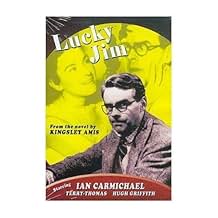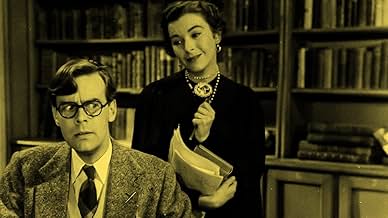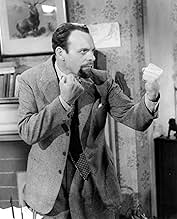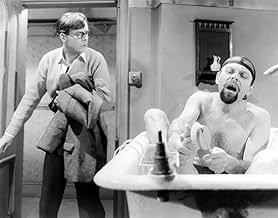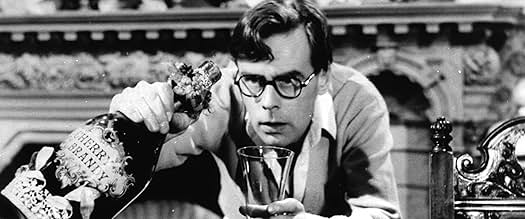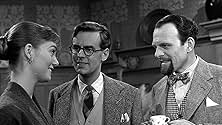Jim Dixon struggles with university work, Professor Welch's boring behavior, and his neurotic friend Margaret Peel. His misery is further complicated by his son Bertrand and companion Christ... Read allJim Dixon struggles with university work, Professor Welch's boring behavior, and his neurotic friend Margaret Peel. His misery is further complicated by his son Bertrand and companion Christine Callaghan.Jim Dixon struggles with university work, Professor Welch's boring behavior, and his neurotic friend Margaret Peel. His misery is further complicated by his son Bertrand and companion Christine Callaghan.
- Director
- Writers
- Stars
John Welsh
- The Principal
- (as John Welch)
Henry B. Longhurst
- Professor Hutchinson
- (as Henry Longhurst)
- Director
- Writers
- All cast & crew
- Production, box office & more at IMDbPro
Featured reviews
Fans of Kingsley Amis's brilliant novel might with justification hate this adaptation, but taken on its own terms, it is an enjoyable slice of 'fifties British comedy. While the novel's bite may have been lost, the movie's troubled production history (a few weeks into the filming, the original director, Ealing's Charles Crichton, was replaced) fails to show on the finished film.
Ian Charmichael is at his best in this movie. The combination of a (realistic) Northern accent, plus a slightly harder edged characterisation, helps distance him from his usual 'silly ass' image. Perhaps he isn't the Dixon of the book, but it is a fair attempt. A first rate cast adds to the fun, in particular a small but perfectly formed cameo by Terry-Thomas steals the movie.
The final chase is, as been noted, the movie's weakest link (it seems to come out of nowhere and does not fit in with the rest of the film) and is it fair from being the best Amiss adaptation (that honour belongs to the wonderful 'Only Two Can Play'). But despite these flaws, it remains a watch able enough movie.
Ian Charmichael is at his best in this movie. The combination of a (realistic) Northern accent, plus a slightly harder edged characterisation, helps distance him from his usual 'silly ass' image. Perhaps he isn't the Dixon of the book, but it is a fair attempt. A first rate cast adds to the fun, in particular a small but perfectly formed cameo by Terry-Thomas steals the movie.
The final chase is, as been noted, the movie's weakest link (it seems to come out of nowhere and does not fit in with the rest of the film) and is it fair from being the best Amiss adaptation (that honour belongs to the wonderful 'Only Two Can Play'). But despite these flaws, it remains a watch able enough movie.
Planned as a follow-up to PRIVATE'S PROGRESS (1956), the Boulting Brothers' version of the Kingsley Amis classic substitutes physical comedy for much of the novel's satire. Ian Carmichael plays Jim Dixon as an amiable dolt, well-meaning but hopelessly lost in a faculty world of would-be Oxbridge dons. Professor Welch (Hugh Griffith) comes across as forgetful yet obsessive; his wife (Jean Anderson) as an incorrigible snob; and their son Bertram (Terry-Thomas) as a pretentious layabout. They inhabit a world of the past, dominated by images of 'Merrie England' - an idealized version of history that in Dixon's view never existed. By contrast Dixon tries to inspire his learners by encouraging them to speculate on alternative versions of the past. The film's enduring theme ("Oh, Lucky Jim!") by John Addison offers an ironic counterpoint to many of the protagonists' misadventures; he is clearly NOT lucky in many of the things he does - for example, bringing a bulldog into the Welches' front room to disrupt their evening concert, or creating total anarchy in the middle of a procession dedicated to the new Chancellor's (Clive Morton's) inauguration. Carmichael possesses a certain degree of comic talent as the innocent lost in a world of pseudo-sophisticates, but the Boultings' attempt to turn him into a Keatonesque figure, complete with a repertoire of India-rubber facial expressions, falls rather flat. The film ends happily with Dixon getting the girl (Sharon Acker), but only after a chase-sequence involving a series of unconvincing studio shots that seems out of place in terms of the film as a whole. It's nice to see him get the better of the Welch family, but we don't get the sense that he is in any proud of his grammar school education which (in terms of the novel at least) is particularly important at the time of the film's original release, when redbrick universities were offering greater opportunities to people from all social backgrounds to advance themselves. The Welch family might not like these social upstarts invading their intellectual space but, in terms of British history as a whole, they were the future while the Welches represented the past.
Kingsley Amis might not had liked the adaptation of his novel set in a redbrick university in 1950s Britain when university education started to expand and took on some working class students. The Boulting brothers film comes across a little too much of an Ealing comedy for my liking with slapstick and loses the novel's edge.
Ian Carmichael is the northern grammar school boy made good but looking for a permanent teaching job at the university. To do this he has to toady to Professor Welch and his family and every task he is entrusted to do ends in disaster sometimes due to Jim's shortcomings.
As a lecturer Jim is passionate with a leftist slant on history in contrast with Professor Welch dull and old fashioned musings which we see when Jim has to deliver Welch's lecture.
In between we have Jim getting into escapades with Terry Thomas and his Canadian girlfriend and a slapstick scene involving a parade with flowers on the quadrant of the university.
However whilst Carmichael is spirited as Jim he looks too old, even worse Terry Thomas looks too old as the son of the Professor Welch.
The film is episodic and although starts promisingly enough it tries too hard to be an Ealing style comedy rather than a satirical adaptation. The redbrick university never convinces maybe I have seen too many of these places that were built in the 1960s.
Ian Carmichael is the northern grammar school boy made good but looking for a permanent teaching job at the university. To do this he has to toady to Professor Welch and his family and every task he is entrusted to do ends in disaster sometimes due to Jim's shortcomings.
As a lecturer Jim is passionate with a leftist slant on history in contrast with Professor Welch dull and old fashioned musings which we see when Jim has to deliver Welch's lecture.
In between we have Jim getting into escapades with Terry Thomas and his Canadian girlfriend and a slapstick scene involving a parade with flowers on the quadrant of the university.
However whilst Carmichael is spirited as Jim he looks too old, even worse Terry Thomas looks too old as the son of the Professor Welch.
The film is episodic and although starts promisingly enough it tries too hard to be an Ealing style comedy rather than a satirical adaptation. The redbrick university never convinces maybe I have seen too many of these places that were built in the 1960s.
Jim Dixon works in that most protected of places a redbrick university! However his natural laziness and clumsiness sees him forced to keep in the favour of the dull and absentminded Professor Welch in order to protect his job. With his natural affinity for bad luck, Jim struggles to find a quiet life and a unwanted romance with Margaret (the professor's friend) just make things more difficult. Things get worse when he is put in charge of organising things for the new chancellor but Welch's son arrives in the company of a beautiful young woman, Christine, who Jim finds very attractive but totally unattainable.
With people like the Boutling brothers, Carmichael and Thomas involved I was definitely going to watch this film when they showed it last week as part of the normal cycle of black & white films on daytime TV afternoons, however I must admit not to be entirely won over by this. I have not read the book on which this is based, but I am told that it is a great deal sharper than this film, not a surprise since the film surprised me by having absolutely no satirical edge to it whatsoever and instead seemed to be aiming to be a vague farce. The plot has no sharp edges to it and it only has a very basic sense of humour that involves more pratfalls than witty dialogue and, as a result, I found little here that I actually cared enough about to get into the film. The laughs weren't forthcoming, the plot was rather shallow and uninteresting and the characters were thin.
With all these problems it is no real surprise that even the talent in this cast struggle to make anything of it. Carmichael plays it all too foppish and clumsy and he never really gets a character out of the film. Even Terry Thomas seems unsure of what he is supposed to be doing with this stuff and he doesn't make any memorable impact. Acker is very pretty and Griffith is suitable cast but generally the cast are let down by the material.
Overall this is an average film that doesn't compare to the many better films that the main cast members, producer and director have all done. Usually I would say that any film with these people involved would be worth seeing but unfortunately I can say it about this outing.
With people like the Boutling brothers, Carmichael and Thomas involved I was definitely going to watch this film when they showed it last week as part of the normal cycle of black & white films on daytime TV afternoons, however I must admit not to be entirely won over by this. I have not read the book on which this is based, but I am told that it is a great deal sharper than this film, not a surprise since the film surprised me by having absolutely no satirical edge to it whatsoever and instead seemed to be aiming to be a vague farce. The plot has no sharp edges to it and it only has a very basic sense of humour that involves more pratfalls than witty dialogue and, as a result, I found little here that I actually cared enough about to get into the film. The laughs weren't forthcoming, the plot was rather shallow and uninteresting and the characters were thin.
With all these problems it is no real surprise that even the talent in this cast struggle to make anything of it. Carmichael plays it all too foppish and clumsy and he never really gets a character out of the film. Even Terry Thomas seems unsure of what he is supposed to be doing with this stuff and he doesn't make any memorable impact. Acker is very pretty and Griffith is suitable cast but generally the cast are let down by the material.
Overall this is an average film that doesn't compare to the many better films that the main cast members, producer and director have all done. Usually I would say that any film with these people involved would be worth seeing but unfortunately I can say it about this outing.
Jim Dixon is a junior lecturer at an unnamed provincial university. Kingsley Amis, who wrote the novel on which this film is based, took his title from a song- "Oh, lucky Jim, How I envy him..." (We hear this song a couple of times during the film). As the story opens, however, Jim does not seem to be particularly lucky or enviable. Indeed, his life can be summed up in the words of the theme-song from "Friends":-
"Your job's a joke, you're broke, your love life's D. O. A."
He hates his job and his boss, Professor Welch. He is perpetually short of cash and forced to live in a seedy lodging-house. His relationship with his possessive, needy girlfriend Margaret appears to be going nowhere and, while he has set his cap at an attractive blonde named Christine, that relationship also appears to be doomed as she is the girlfriend of Welch's novelist son Bertrand.
The novel has long been a favourite of mine, but I have never had the same affection for the film version, largely because the film-makers never manage to find an equivalent for Amis's bitingly satirical authorial voice. Scenes which are brilliantly funny in the book, such as Professor Welch's disastrous musical weekend, in the course of which Jim manages to set fire to his bed, or the one in which Jim delivers a lecture while drunk, never come to life in the same way on the screen. The scriptwriters also include some episodes of slapstick humour not found in the book, such as Jim's attempt to organise the floral decorations at an academic ceremony or the chase scene at the end, but these are no substitute for Amis's savage wit.
Ian Carmichael was later to gain a reputation for playing upper-class characters such as Bertie Wooster or the aristocratic detective Lord Peter Wimsey, but in 1957 these productions still lay in the future. Even so he still seems a bit too posh for Jim, who is supposed to be a working-class Northerner, as well as a bit too old at 37. This means that the question of social class, an important theme in the novel, is rather avoided in the film. Contrary to what one reviewer writes, Amis, who in 1954 still considered himself to be on the Left, was not using "Lucky Jim" to satirise well-heeled bourgeois Leftists. (Later, when he had moved sharply to the Right, he was to lay into radical-chic champagne socialists with gusto in novels like "Girl, 20" from 1971). Professor Welch, with his romantic fantasies of some pre-modern pre-industrial "Merrie England", is a nostalgia-obsessed cultural conservative, and Bertrand probably a political one.
The Jim of the novel is in many ways a flawed character. For one who hopes to make a living by teaching history, he displays a surprising lack of enthusiasm for his subject. He drinks too much, often treats Margaret badly and can be rude and tactless. He devotes a lot of energy to pursuing feuds against those who annoy him and can be oddly childish. The character in the film is very much watered down in an attempt to make him more likeable; this attempt succeeds to some extent, but at the cost of also making him less interesting.
Maureen Connell's Margaret is less neurotic, hysterical and manipulative here than she is in the book, and as a result becomes completely forgettable. Sharon Acker's Christine is almost equally so. (Christine was English in the book but here becomes Canadian, possibly in order to make the film more marketable in North America). Those characters in the film who do stand out tend to be those who are played in the same way as they are in the novel, notably Hugh Griffith's absent-minded, evasive, pedantic and pretentious Professor Welch and Terry-Thomas's pompous, self-important, snobbish and bullying Bertrand. (Like Carmichael, however, Terry-Thomas at 46 was really too old. He was actually a year older than Griffith who plays his father).
The film is not altogether a bad one and can provide a few amusing moments. When one considers how good its source novel is, however, it really should have been a lot better. 6/10.
"Your job's a joke, you're broke, your love life's D. O. A."
He hates his job and his boss, Professor Welch. He is perpetually short of cash and forced to live in a seedy lodging-house. His relationship with his possessive, needy girlfriend Margaret appears to be going nowhere and, while he has set his cap at an attractive blonde named Christine, that relationship also appears to be doomed as she is the girlfriend of Welch's novelist son Bertrand.
The novel has long been a favourite of mine, but I have never had the same affection for the film version, largely because the film-makers never manage to find an equivalent for Amis's bitingly satirical authorial voice. Scenes which are brilliantly funny in the book, such as Professor Welch's disastrous musical weekend, in the course of which Jim manages to set fire to his bed, or the one in which Jim delivers a lecture while drunk, never come to life in the same way on the screen. The scriptwriters also include some episodes of slapstick humour not found in the book, such as Jim's attempt to organise the floral decorations at an academic ceremony or the chase scene at the end, but these are no substitute for Amis's savage wit.
Ian Carmichael was later to gain a reputation for playing upper-class characters such as Bertie Wooster or the aristocratic detective Lord Peter Wimsey, but in 1957 these productions still lay in the future. Even so he still seems a bit too posh for Jim, who is supposed to be a working-class Northerner, as well as a bit too old at 37. This means that the question of social class, an important theme in the novel, is rather avoided in the film. Contrary to what one reviewer writes, Amis, who in 1954 still considered himself to be on the Left, was not using "Lucky Jim" to satirise well-heeled bourgeois Leftists. (Later, when he had moved sharply to the Right, he was to lay into radical-chic champagne socialists with gusto in novels like "Girl, 20" from 1971). Professor Welch, with his romantic fantasies of some pre-modern pre-industrial "Merrie England", is a nostalgia-obsessed cultural conservative, and Bertrand probably a political one.
The Jim of the novel is in many ways a flawed character. For one who hopes to make a living by teaching history, he displays a surprising lack of enthusiasm for his subject. He drinks too much, often treats Margaret badly and can be rude and tactless. He devotes a lot of energy to pursuing feuds against those who annoy him and can be oddly childish. The character in the film is very much watered down in an attempt to make him more likeable; this attempt succeeds to some extent, but at the cost of also making him less interesting.
Maureen Connell's Margaret is less neurotic, hysterical and manipulative here than she is in the book, and as a result becomes completely forgettable. Sharon Acker's Christine is almost equally so. (Christine was English in the book but here becomes Canadian, possibly in order to make the film more marketable in North America). Those characters in the film who do stand out tend to be those who are played in the same way as they are in the novel, notably Hugh Griffith's absent-minded, evasive, pedantic and pretentious Professor Welch and Terry-Thomas's pompous, self-important, snobbish and bullying Bertrand. (Like Carmichael, however, Terry-Thomas at 46 was really too old. He was actually a year older than Griffith who plays his father).
The film is not altogether a bad one and can provide a few amusing moments. When one considers how good its source novel is, however, it really should have been a lot better. 6/10.
Did you know
- TriviaAt 46 Terry-Thomas was a year older than Hugh Griffith, who played his father. Jean Anderson, playing his mother, was only 4 years older than Thomas.
- GoofsThe taxi used by Jim and Christine when leaving the ball has 'Taxi' on a paper sign in the windscreen which is not there in long shot.
- Crazy creditsOpening credits prologue: A Redbrick University in Britain's new Elizabethan age: here are moulded the intellectual Drakes and Raleighs of tomorrow - fearless, independent - and state supported
- ConnectionsReferenced in The Bill: Lucky Jim (1999)
- How long is Lucky Jim?Powered by Alexa
Details
- Release date
- Country of origin
- Language
- Also known as
- Volltreffer ins Glück
- Filming locations
- The Royal Masonic School, Bushey, Hertfordshire, England, UK(red-brick university where Jim works)
- Production companies
- See more company credits at IMDbPro
- Runtime
- 1h 35m(95 min)
- Color
Contribute to this page
Suggest an edit or add missing content

